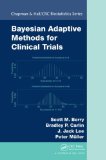Currently well-known in the analysis of health-related device trials, adaptive Bayesian styles are increasingly getting used in drug development for a wide range of illnesses and conditions, from Alzheimer’s illness and many sclerosis to obesity, diabetes, hepatitis C, and HIV. Written by leading pioneers of Bayesian clinical trial designs, Bayesian Adaptive Strategies for Clinical Trials explores the growing function of Bayesian pondering in the quickly changing globe of clinical trial analysis. The book fi
List Price: $ 94.95
Cost: [wpramaprice asin=”1439825483″]


Leave a Reply
You must be logged in to post a comment.